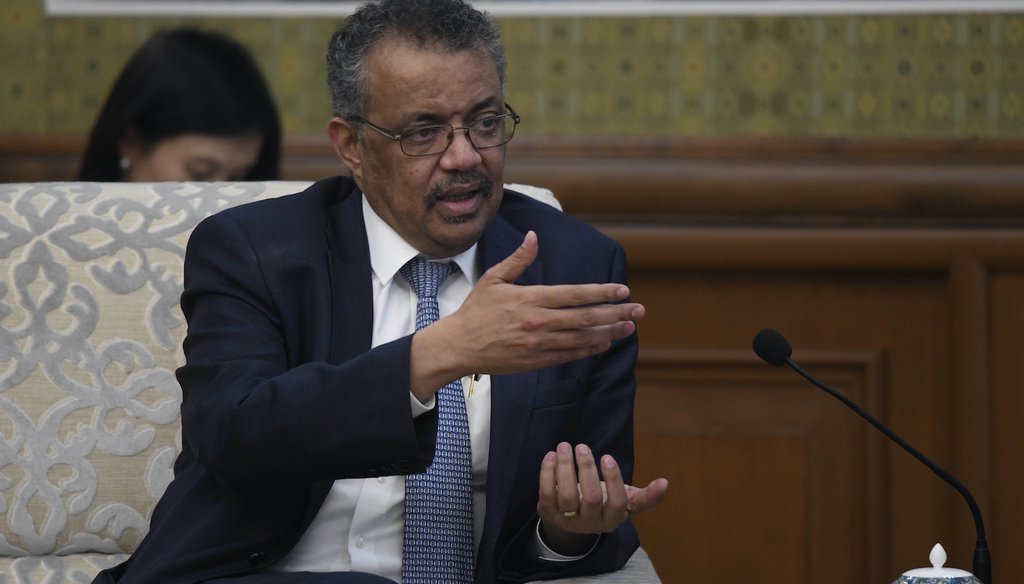

Our only agenda is to publish the truth so you can be an informed participant in democracy.
We need your help.


Tedros Adhanom, director general of the World Health Organization. (AP)
• The WHO told us that a child’s presence at school would only count as consent if a parent had already received advance notice of a planned immunization and been given the opportunity to opt out or take appropriate steps to express their desire to do so.
• The World Health Organization doesn’t have any legal ability to determine vaccine policy in the United States.
A Facebook post implies that sending your child to school will automatically enroll them in one of the World Health Organization’s vaccination programs.
The post features an image of the WHO’s logo. Text above the image reads, "BREAKING: WHO now says your child’s presence in school counts as ‘informed consent’ for vaccination - parental presence not required."
The post doesn’t provide any sources or supporting evidence. We found that it misleadingly describes the way in which the WHO defines informed consent. In addition, according to legal experts, the WHO has no power to determine public health policy in the United States or any other member country.
According to the WHO press office, the organization recommends that member countries instituting child vaccination programs receive consent from a parent or guardian through one of three different mechanisms: verbal, written, or implied.
The first two mechanisms are straightforward: Verbal consent means that a parent or guardian has accompanied their child to a vaccination and agreed to it in person. Written consent means that a parent or guardian has given their approval of the vaccination in writing.
The third mechanism, implied consent, is the most relevant to the claims of the post. According to the WHO, parents grant implied consent when they send their children to a vaccination session after being notified by health authorities that vaccinations will occur at that particular time and place.
For example, the WHO said in an email, "the presence of the child at school on the vaccination date may be taken as implied consent if the parents have been informed that the vaccination would take place and given the opportunity to opt out or take appropriate steps to express their desire to do so."
The WHO published a document describing the difference between written, verbal, and implied forms of consent in 2014. The document notes that there are problems with implied consent, and it encourages countries to adopt other consent mechanisms "that ensure that parents have been informed and agreed to the vaccination."
Something else to keep in mind as you see posts like these: The WHO does not control public health policy in the United States.
According to experts in global health law, the organization has no legal power in any of its member countries. The U.S. is still a member country of the WHO, although President Trump officially started the yearlong process to withdraw from the organization on Jul. 6, 2020.
"The WHO’s legal structure cannot dictate what goes on on the ground in individual countries, or municipalities," said Teneille Brown, a professor of law and bioethics at the University of Utah S.J. Quinney College of Law.
Lawrence Gostin, a professor of global health law at Georgetown University who advises the WHO, agreed with Brown.
"There are certain WHO treaties to which the U.S. has voluntarily signed up, like the International Health Regulations. But these treaties do not control U.S. law and there is nothing in the IHR that would require vaccination. That is solely within the U.S. sovereign power," he wrote in an email.
When asked point blank whether the WHO has any ability whatsoever to dictate vaccination policy in the United States, Gostin replied, "Absolutely not."
A Facebook post says, the "WHO now says your child’s presence in school counts as ‘informed consent’ for vaccination - parental presence not required."
The WHO told us that a child’s presence at school would only count as consent if a parent has received advance notice of a planned immunization and been given ample opportunity to opt out.
Even if the post had accurately described a public statement by the WHO, the organization has no ability to determine vaccine policy in the United States.
We rate this post False.
A Facebook post, Oct. 15, 2020
NPR, Trump sets date to end WHO membership over its handling of virus, Jul. 7, 2020
World Health Organization, Considerations regarding consent in vaccinating children and adolescents between 6 and 17 years old, 2014
In a world of wild talk and fake news, help us stand up for the facts.
